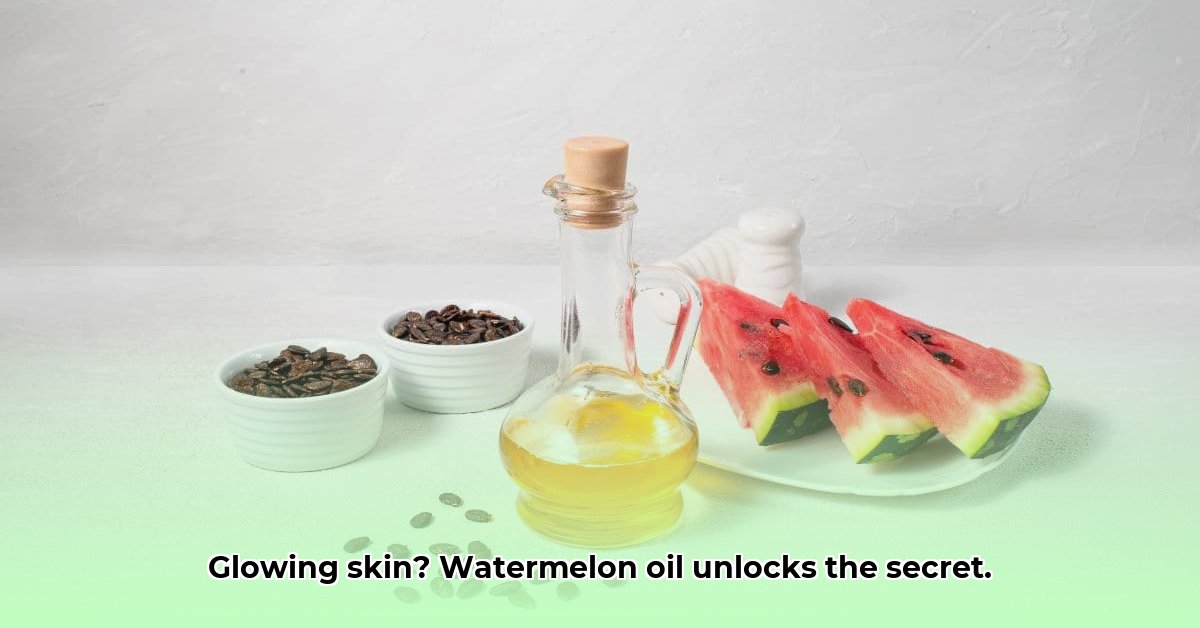
Benefits of Watermelon Seed Oil: A Comprehensive Review
Watermelon seed oil, a byproduct of watermelon cultivation, is rapidly gaining popularity as a skincare ingredient. Its purported benefits, ranging from intense hydration to potential anti-aging effects, stem from its rich composition of essential fatty acids and antioxidants. This review examines the scientific evidence supporting these claims, compares it to other popular oils like rosehip oil, and provides practical guidance for incorporating it into your skincare routine.
Deep Hydration: A Scientific Look
Watermelon seed oil is abundant in essential fatty acids, including linoleic, oleic, stearic, and palmitic acid. These fatty acids are crucial for maintaining the skin's barrier function, preventing moisture loss, and promoting a supple, healthy complexion. Studies, while limited, suggest a positive correlation between topical application of watermelon seed oil and improved skin hydration. However, more rigorous research is needed to establish definitive conclusions on its efficacy compared to established moisturizers. Isn't it fascinating how these tiny molecules can significantly influence our skin's health and appearance?
Soothing Inflammation: Evidence and Limitations
The presence of vitamin E (tocopherols) and fatty acids in watermelon seed oil contributes to its potential anti-inflammatory properties. These components may help reduce redness and soothe irritated skin, potentially benefiting individuals with sensitive skin or conditions like eczema or rosacea. However, currently available research on this aspect is preliminary, with larger-scale clinical trials necessary to confirm these effects and establish a clear mechanistic understanding. What further research could reveal about its efficacy in treating inflammatory skin conditions is incredibly exciting.
Anti-Aging Potential: Fact or Fiction?
Watermelon seed oil contains antioxidants, including vitamins A and E, and various phenolic compounds, that combat free radical damage—a key factor in skin aging. This antioxidant activity suggests a potential role in delaying the visible signs of aging, such as wrinkles and fine lines. However, the evidence supporting this claim is largely observational and requires more robust clinical trials to definitively assess its anti-aging efficacy. It's important to remember that while promising, the anti-aging effects need further scientific investigation. Isn't it remarkable to consider how natural substances can interact with our complex biology?
Watermelon Seed Oil vs. Rosehip Oil: A Comparative Analysis
Both watermelon seed oil and rosehip oil are popular choices for skincare, sharing similarities in their fatty acid profiles and antioxidant content. However, their specific compositions differ. Rosehip oil is often richer in linoleic acid, while watermelon seed oil boasts a higher concentration of vitamin E. The choice between the two depends on individual skin needs and preferences. If intense hydration and potent antioxidant protection are priorities, watermelon seed oil could be a better choice. A fact-based comparison is paramount when choosing a skincare product; it allows for informed decisions, tailored to individual needs.
Choosing and Using Watermelon Seed Oil: An Instructional Guide
Selecting high-quality watermelon seed oil is crucial for optimal results. Look for products labeled as cold-pressed (a method that retains more nutrients), organic, and sustainably sourced. Third-party certifications, such as those from reputable organizations, provide reassurance of quality and ethical production.
Step-by-Step Usage Guide:
- Cleanse: Start with a thoroughly cleansed face, removing makeup and impurities.
- Apply: Apply 2-3 drops of oil to your face and neck. More may be needed depending on your skin type and the area you're applying it to.
- Massage: Gently massage the oil into your skin using upward, circular motions to improve absorption and circulation.
- Timing: Watermelon seed oil can be used both morning and night, or as needed.
- Patch Test: Always perform a patch test on an inconspicuous area of skin before applying it to your entire face, especially if you have sensitive skin.
Potential Side Effects and Precautions
While generally well-tolerated, some individuals may experience mild irritation, such as redness or a slight burning sensation. Conducting a patch test is essential before widespread use. Additionally, while external application is safe, ingesting large quantities might affect blood pressure - therefore, its use should be restricted to topical application. Understanding potential side effects allows for responsible and safe usage.
Conclusion: Unveiling the Potential of Watermelon Seed Oil
Watermelon seed oil offers a promising addition to your skincare routine, exhibiting noteworthy moisturizing and potentially anti-inflammatory and anti-aging properties. While further research is needed to fully understand its long-term effects, the current scientific evidence suggests that its benefits are worth exploring. Remember, individual results may vary, and patience is key when introducing new skincare products. Always consult with a dermatologist if you have concerns or pre-existing skin conditions.